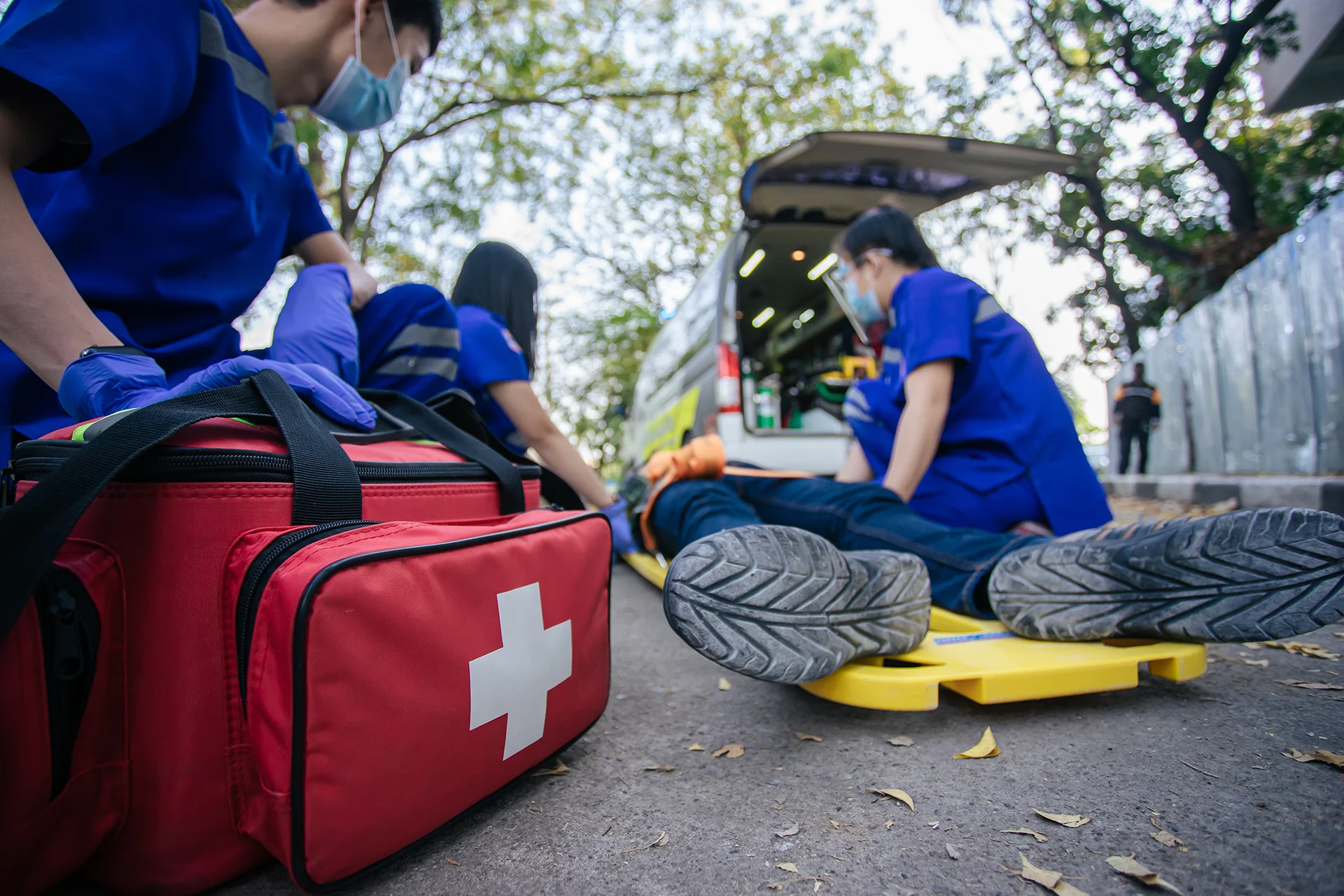Allied Health
Thousands of workers in hundreds of different roles make up Philadelphia’s healthcare workforce, including many Allied Health Professionals. Opportunities to earn higher wages and take on more responsibilities at work are open to workers in the Allied Health field, with many positions first requiring completion of classroom training and a credentialing examination.
The Training Fund helps entry-level prepare for and obtain the credentials needed for these professional Allied Health roles. Call or visit us today to start planning YOUR Allied Health Career Pathway.
ALLIED HEALTH CARE COURSES (ONLINE COURES AVAILABLE)
| Pharmacy Technician | This four-month part-time online course prepares students for the pharmacy technician certification examination. This course is presently open to District 1199C union members only. |
| Telemetry Technician | This three-month online course provides students with the skills necessary to analyze and interpret normal and abnormal cardiac rhythms in a clinical telemetry setting. This online course is presently open to District 1199C union members only. |
| SPD (Supply, Processing & Distribution) | This intensive part-time online program prepares students to attain Certified Registered Central Service Technician (CRCST) certification through the International Association of Healthcare Central Service Material Management (IAHCSMM). This online course is presently open to District 1199C union members only.
For more information, please contact Michelle Heyward-Ramsey, Hospital Liaison Director, at mramsey@1199ctraining.org. |
| ServSafe | 16-hour course prepares students for the National Restaurant Association’s ServSafe examination (certification valid for five years). This course is presently open to District 1199C union members only. |
For more information, please contact Michelle Heyward-Ramsey, Hospital Liaison Director, at mramsey@1199ctraining.org.
Behavioral Health
Behavioral Health Professionals provide essential services in many different care settings, and work with many different patient populations. Caring for individuals requiring mental/behavioral health care, with developmental disorders or histories of substance abuse and/or addiction, Behavioral Health workers must be able to demonstrate unique skill sets which set this Career Pathway apart from other direct care occupations.
Students in the Training Fund’s Behavioral Health programs work towards several different credentials, from occupational certificates through associate, bachelor’s and master’s degrees. Wherever you’re at in your Behavioral Health career, we’re here to help you advance.
Behavioral Health Career Pathways
Semi-skilled Position
Peer Support Specialist
- High School Diploma or GED®
1st Level Certification
Behavioral Health Technician
- 9-months (part-time) Certificate program
- 501 openings / year in the Delaware Valley
Mid Level Certification
Mental Health & Substance Abuse Worker
- 30-credit certificate from Philadelphia University
- 631 openings / year in the Delaware Valley
Professional Certification
Associate degree: Human Services
- Certificate articulates with Philadelphia University
Bachelor and Master-level degrees
- Certificate articulates with Philadelphia University
Behavioral Health Technician (BHT) Program
The Behavioral Health Technician (BHT) certificate program prepares students to work in behavioral health fields including mental health, development and intellectual disabilities, and drug and alcohol rehabilitation.
COLLEGIATE PARTNERSHIP PROGRAM
The Training Fund’s partnership with Philadelphia University connects the Fund’s BHT program with Behavioral Health Certificate and Associate’s Degree programs at Philadelphia University. The Partnership creates three steps allowing behavioral health workers to move up their career ladders through collegiate study:
Step 1: FREE Behavioral Health Technician (BHT) Program at the Training Fund
Step 2: 30-credit Behavioral Health Collegiate Certificate Program at Philadelphia University
Step 3: Associate’s Degree in Health & Human Services at Philadelphia University
Graduates of the Philadelphia University Associate’s Degree program are eligible to apply for admission to the Philadelphia University Bachelor of Arts degree program in Behavioral Health.
For more information, please contact Shona Murphy smurphy@1199ctraining.org, Joann Miller jmiller@1199ctraining.org, or Traci Kinsler tkinsler@1199ctraining.org.

EMT Training
Do you want a stable career with advancement opportunities? Become An Emergency Medical Technician (EMT). Classes held at 1199C Training Fund.
| 1199C Union Member Class | Entrance Requirements
Training Includes
Program Costs
Program Schedule (Based on Availability)
|
| Community Program | Entrance Requirements
Training Includes
Program Costs
Program Schedule (Based on Availability)
|
Enrollment Process
- Apply online
- Attend an information session
- Participate in a phone interview
- Take an academic assessment
- Participate in a second interview
- Complete background checks
- Enroll in program
Apply now and choose EMT as the program of interest!
After you apply, you will receive an email with an invitation to attend an information session. Be sure to give us a valid email that you regularly check.
For more information, please contact Michelle Heyward-Ramsey, Hospital Liaison Director, at mramsey@1199ctraining.org.

Health Information
As technology – especially the Electronic Health Record – becomes more important to healthcare providers, so do the skills of Health Information Professionals. From the Medical Office Assistants who welcome patients into physicians’ practices, to Health Information Administrators at hospitals or long-term care facilities, to high-level Data Analysts who help whole health systems manage and understand their patients’ health data, Health Information careers are growing fast.
With such rapid employment growth at all skill levels, our Health Information Career Pathway offers valuable training opportunities for both new students and current healthcare workers looking to gain marketable skills that employers want.
Health Information Pathways
Semi-skilled Position
Unit Clerk or Entry-Level Medical Office
- High School Diploma or GED®
- 229 openings / year in the Delaware Valley
1st Level Certification
Senior-Level Medical Office Worker
- 40-week (part-time) Electronic Health Record Certificate
- 229 openings / year in the Delaware Valley
Technical Program
Certified Medical Coder
- 39-credit certificate from Camden Community College
- 229 openings / year in the Delaware Valley
Professional Certification
Registered Health Information Technician (RHIT)
- Associate degree in Health Information Management
- 217 openings / year in the Delaware Valley
Registered Health Information Administrator (RHIA)
- Bachelor’s Degree in Health Information
- 217 openings / year in the Delaware Valley
Electronic Health Record Certificate Program – Union Members Only
The Training Fund’s 40-week, part-time Electronic Health Record Certificate (EHRC) Program provides students with instruction on the Electronic Health Record, emphasizing strong computer proficiency. EHRC graduates qualify to test for the Digital Patient Record Certification (DPRC) Credential. This program is helpful for healthcare workers in clerical positions such as Unit Clerk, as well as direct care positions like Nurse Aide. The EHRC Program can also help incumbent healthcare workers from all backgrounds move into the health information field.
For more information, please contact Michelle Heyward-Ramsey, Hospital Liaison Director, at mramsey@1199ctraining.org.
Medical Coding Program
This part-time program, offered at the Training Fund’s Breslin Learning Center in partnership with Camden County College, prepares students to take the American Health Information Management Association (AHIMA) Certified Coding Associate examination. Instruction covers both theory and real-world applications and is offered in a traditional classroom setting and online. The Medical Coding program includes a 90-hour worksite or virtual coding internship, as well as job placement assistance. Graduates earn 39 college credits that articulate with the Camden County College Associate Degree in Health Information.
For more information, please contact Tuition Reimbursement: 215-568-2220.

Opioid Crisis Training
Opioid Crisis Training (OCT) is an exciting, free training program designed to provide adult professionals with enhanced training and professional development to aid in the recovery of individuals battling opioid and other addictions.
Three Training Tracks Available:
Track 1: Will provide 150 frontline professionals with a 25-hour training class. Classes meet once per week for 2.5 hours. Upon successful completion, trainees will receive an Opioid Specialization Training certificate from the Department of Behavioral Health and Intellectual disAbility Services (DBHIDS).
Class topics include:
- Outreach and engagement
- Withdrawal management
- Naloxone overdose and rescue
- Harm reduction
- Understanding co-occurring disorders
- Warm hand off between emergency departments and treatment providers
Track 2: Will provide 50 frontline professionals with certified recovery specialist (CRS) training or certified family recovery specialist (CFRS) training. The cost of the certification exam is covered through the program.
Track 3: Supervision of Peer Recovery Support Specialists (PRSS), a 12-hour training program available for supervisors of frontline staff.
Employers & Professionals Can Participate in A Variety Of Ways:
- Organizations can host trainings onsite and/or refer staff to trainings
- Frontline professionals can directly enroll in training tracks
- Organizations and professionals should apply for training here (dead link)
For more information, please contact Audie Murphy, Direct Care Worker Grant, amurphy@1199ctraining.org.
Registered Apprenticeship Program
The care economy is the fastest growing economy as the demand for early childhood education and healthcare is increasing throughout the country. Occupations such as Pre-K Teacher, Early Childhood Educator, Child Development Specialist, Nursing, Personal and Home Health Assistants, and more will increase by almost 40% in the coming years.
Learn More

